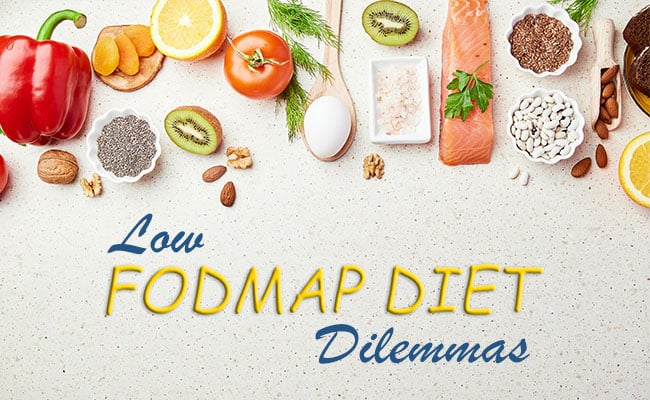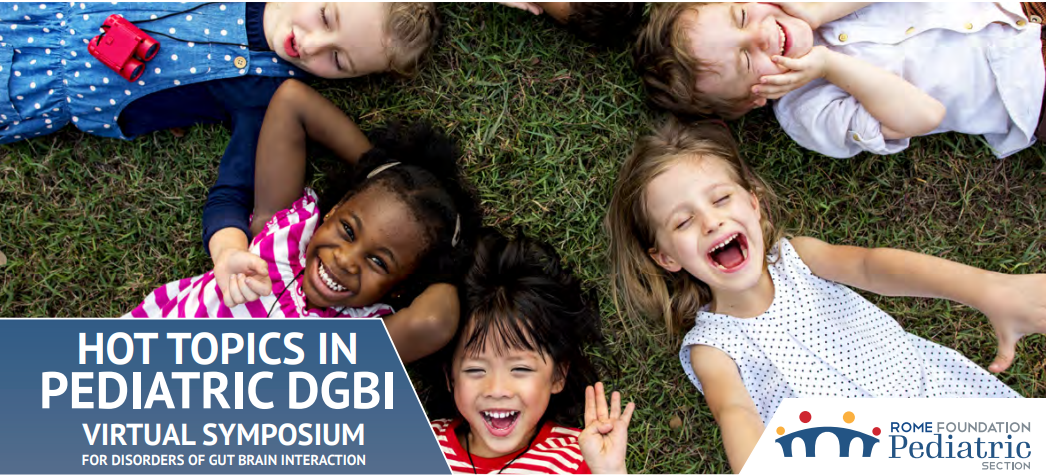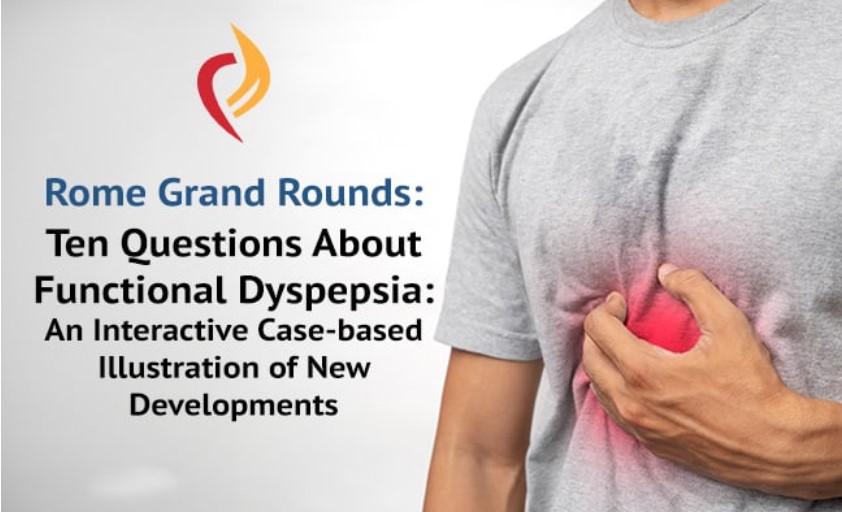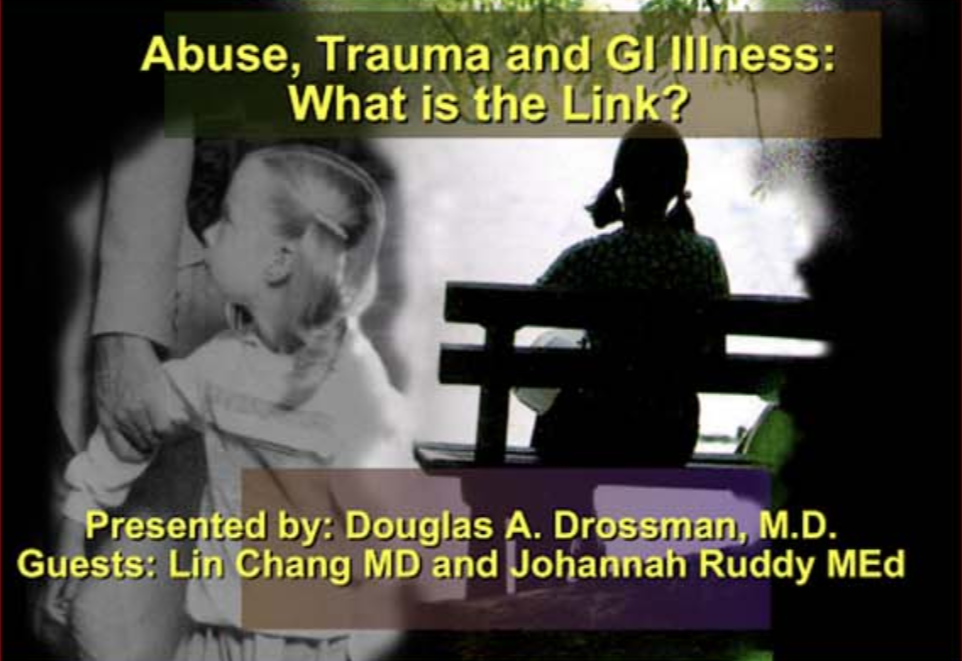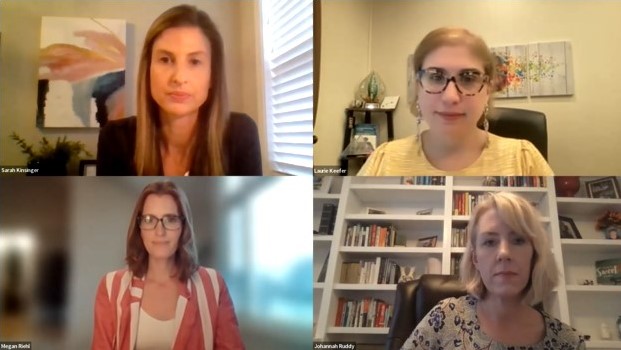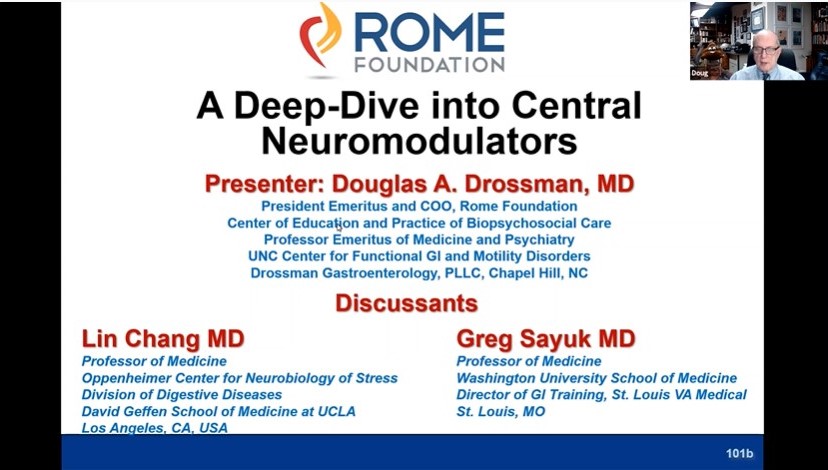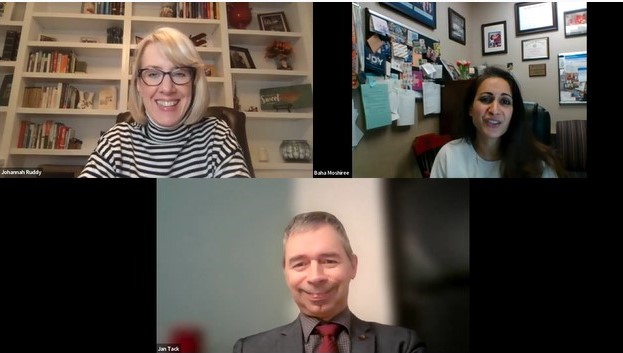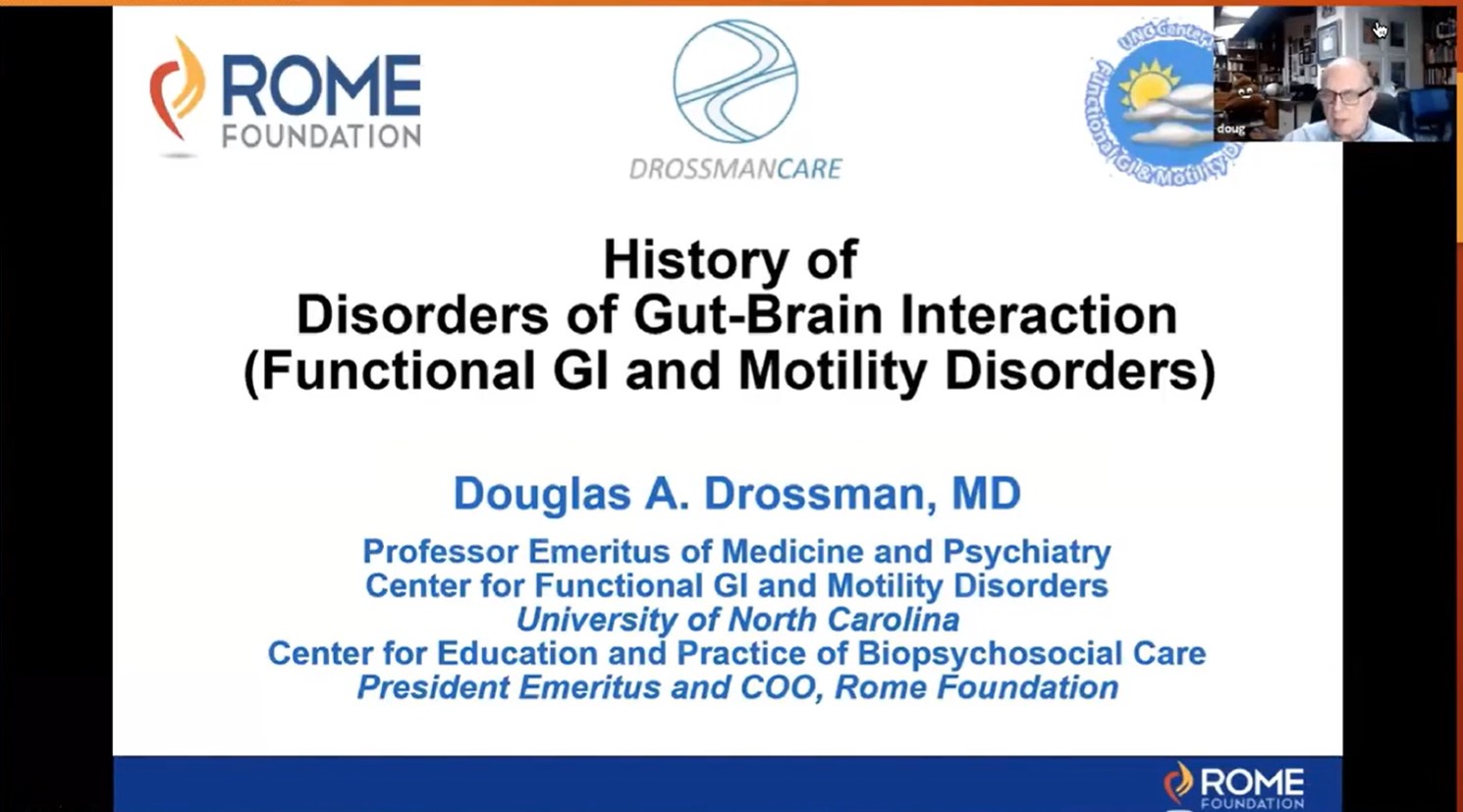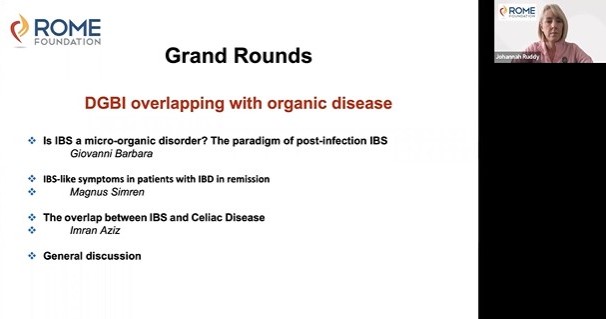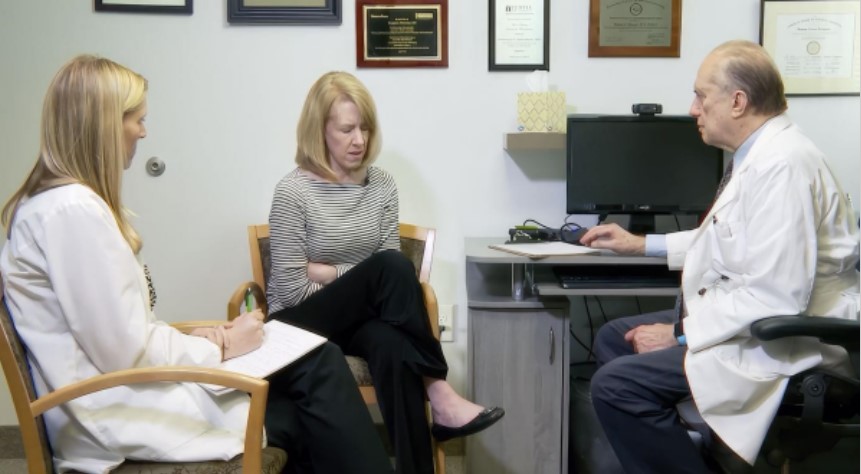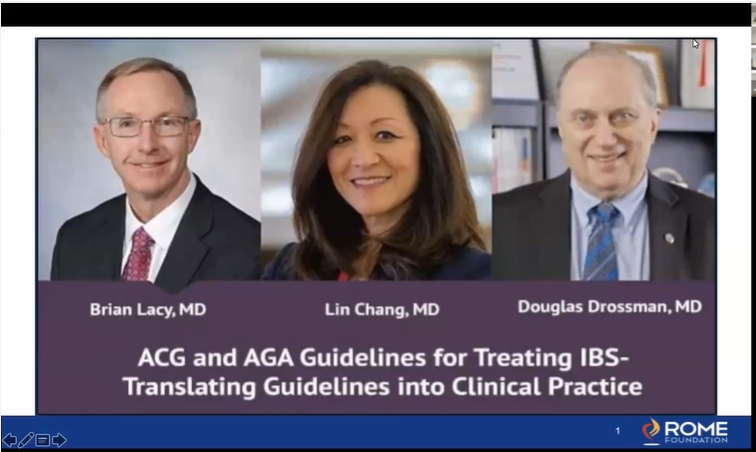 Rome Campus
Rome Campus
A Simplified Approach to the Low FODMAP Diet
How to Start the Conversation Around Diet & DGBI
Scientific evidence for a central role of food in IBS
Low FODMAP Diet Dilemmas: A Case-based Approach
Clinical Pearls from Interdisciplinary Treatment of Functional Constipation and Fecal Incontinence
Clinical Pearls from Interdisciplinary Treatment of Pediatric DGBIs: Nutrition and Eating Behaviors
GastroPsych Skills for GI Advanced Practice Providers Treating IBS-C
GastroPsych Pediatric Clinical Case Conference Series
Rome Foundation GastroPsych Clinical Case Conference Series - Session One
Rome Foundation GastroPsych Clinical Case Conference Series - Session Two
Rome Foundation GastroPsych Clinical Case Conference Series - Session Three
Rome Foundation GastroPsych Clinical Case Conference Series - Session Four
Rome Foundation GastroPsych Clinical Case Conference Series - Session Five
Rome Foundation GastroPsych Clinical Case Conference Series - Session Six
Rome Foundation GastroPsych Clinical Case Conference Series - Session Seven
Rome Foundation GastroPsych Clinical Case Conference Series - Session Eight
Back to School with Disorders of Gut Brain Interactions
Psychosocial and Cultural Considerations in GI Behavioral Health
Integrating Group Therapy into GI Behavioral Health Practice
Psychogastroenterology Basic Skills Workshop
Hypnosis Techniques in Psychogastroenterology
An introduction to Acceptance and Commitment Therapy for Disorders of Gut-Brain Interaction (DGBI)
Behavioral Interventions for DGBI Conditions of the Upper GI Tract
Cognitive-Behavioral Therapy for Avoidant/Restrictive Food Intake Disorder (ARFID)
GI Physiology for the Behavioral Health Provider
2023 Pediatric Symposium: Hot Topics in Pediatric DGBI
Rome Foundation Virtual Pediatric Symposium - 0 CE Credits
Diet & Nutrition: Which Diet for Which Patient?
Grand-Rounds 2025 - A Global Approach to Refractory Constipation
Grand Rounds 2025 - Anorectal Biofeedback Therapy: When, How To Do It, & How Useful
Grand Rounds 2025 - Clinical Pearls for Constipation Beyond Guidelines
Grand Rounds 2025 - It takes a Village. An integrated approach to the management of IBS-C.
Grand Rounds 2025: Belching, Rumination and Inability to Belch
Grand Rounds 2025 - How to Understand, Diagnose and Manage the IBS / Organic Disease Overlap
Grand Rounds - Demystifying Gastroparesis: Lessons from Around the World
Highlights of Lead Papers from the Rome Foundation Global Epidemiology Study
Grand Rounds 2024 - Scientific evidence for a central role of food in IBS
Grand Rounds 2024 - Low FODMAP Diet Dilemmas: A Case-based Approach
Grand Rounds 2024: The 3 step approach to Integrated Psychosocial Care in DGBI
Grand Rounds 2024: Abdominal Bloating and Distension
Grand Rounds 2024: Abuse, Trauma, and Illness: What is the link?
Grand Rounds: Communication Skills
Grand Rounds: Sociocultural aspects of the assessment and treatment of patients with DGBI
Grand Rounds: Post Covid-19 DGBI
Grand Rounds: Deep Dive Into Central Neuromodulators
Grand Rounds: DGBI in Pediatric Populations
Grand Rounds: Gastroparesis vs FD
Grand Rounds: History of Disorders of Gut-Brain Interaction - DGBI (Functional GI Disorders)
Grand Rounds: DGBI Overlapping with Organic Disease
When Functional Dyspepsia Meets Gastroparesis
Functional Dyspepsia–Constipation Overlap: An Under-Recognized Clinical Challenge
Complimentary - Approach to Refractory Constipation
A simplified approach to the Low FODMAP Diet - complimentary
Anorectal Biofeedback Therapy: When, How To Do It, & How Useful
Clinical Pearls for Constipation Beyond Guidelines
From Infection to Persistent Gastrointestinal Symptoms: Post-Infectious IBS
Belching, Rumination and Inability to Belch
It takes a Village. An integrated approach to the management of IBS-C.
Grand Rounds 2025 - How to Understand, Diagnose and Manage the IBS / Organic Disease Overlap
Grand Rounds - Demystifying Gastroparesis: Lessons from Around the World
Highlights of Lead Papers from the Rome Foundation Global Epidemiology Study
Grand Rounds 2024 - Scientific evidence for a central role of food in IBS
GastroPsych - Integrating Group Therapy into GI Behavioral Health Practice
Grand Rounds 2024 - Low FODMAP Diet Dilemmas: A Case-based Approach
Grand Rounds: The 3 step approach to Integrated Psychosocial Care in DGB
Grand Rounds: Abdominal Bloating and Distension
Grand Rounds: Abuse, Trauma, and Illness: What is the link?
Grand Rounds: ACG vs AGA IBS Guidelines and Clinical Application
Clinical Pearls from Interdisciplinary Treatment of Functional Constipation and Fecal Incontinence
Clinical Pearls from Interdisciplinary Treatment of Pediatric DGBIs: Nutrition and Eating Behaviors
GastroPsych Skills for GI Advanced Practice Providers Treating IBS-C
GastroPsych Pediatric Clinical Case Conference Series
Rome Foundation GastroPsych Clinical Case Conference Series - Session One
Rome Foundation GastroPsych Clinical Case Conference Series - Session Two
Rome Foundation GastroPsych Clinical Case Conference Series - Session Three
Rome Foundation GastroPsych Clinical Case Conference Series - Session Four
Rome Foundation GastroPsych Clinical Case Conference Series - Session Five
Rome Foundation GastroPsych Clinical Case Conference Series - Session Six
Rome Foundation GastroPsych Clinical Case Conference Series - Session Seven
Rome Foundation GastroPsych Clinical Case Conference Series - Session Eight
Back to School with Disorders of Gut Brain Interactions
Psychosocial and Cultural Considerations in GI Behavioral Health
Integrating Group Therapy into GI Behavioral Health Practice
Psychogastroenterology Basic Skills Workshop
Hypnosis Techniques in Psychogastroenterology
An introduction to Acceptance and Commitment Therapy for Disorders of Gut-Brain Interaction (DGBI)
Behavioral Interventions for DGBI Conditions of the Upper GI Tract
Cognitive-Behavioral Therapy for Avoidant/Restrictive Food Intake Disorder (ARFID)
Diet & Nutrition: Which Diet for Which Patient?
Grand-Rounds 2025 - A Global Approach to Refractory Constipation
Grand Rounds 2025 - Anorectal Biofeedback Therapy: When, How To Do It, & How Useful
Grand Rounds 2025 - Clinical Pearls for Constipation Beyond Guidelines
Grand Rounds 2025 - It takes a Village. An integrated approach to the management of IBS-C.
Grand Rounds 2025: Belching, Rumination and Inability to Belch
Grand Rounds 2025 - How to Understand, Diagnose and Manage the IBS / Organic Disease Overlap
Grand Rounds - Demystifying Gastroparesis: Lessons from Around the World
Highlights of Lead Papers from the Rome Foundation Global Epidemiology Study
Grand Rounds 2024 - Scientific evidence for a central role of food in IBS
Grand Rounds 2024 - Low FODMAP Diet Dilemmas: A Case-based Approach
Grand Rounds 2024: The 3 step approach to Integrated Psychosocial Care in DGBI
Grand Rounds 2024: Abdominal Bloating and Distension
Grand Rounds 2024: Abuse, Trauma, and Illness: What is the link?
Grand Rounds: Communication Skills
Grand Rounds: Sociocultural aspects of the assessment and treatment of patients with DGBI
Grand Rounds: Post Covid-19 DGBI
Grand Rounds: Deep Dive Into Central Neuromodulators
Grand Rounds: DGBI in Pediatric Populations
Grand Rounds: Gastroparesis vs FD
Grand Rounds: History of Disorders of Gut-Brain Interaction - DGBI (Functional GI Disorders)
When Functional Dyspepsia Meets Gastroparesis
Functional Dyspepsia–Constipation Overlap: An Under-Recognized Clinical Challenge
Complimentary - Approach to Refractory Constipation
A simplified approach to the Low FODMAP Diet - complimentary
Anorectal Biofeedback Therapy: When, How To Do It, & How Useful
Clinical Pearls for Constipation Beyond Guidelines
From Infection to Persistent Gastrointestinal Symptoms: Post-Infectious IBS
Belching, Rumination and Inability to Belch
It takes a Village. An integrated approach to the management of IBS-C.
Grand Rounds 2025 - How to Understand, Diagnose and Manage the IBS / Organic Disease Overlap
Grand Rounds - Demystifying Gastroparesis: Lessons from Around the World
Highlights of Lead Papers from the Rome Foundation Global Epidemiology Study
Grand Rounds 2024 - Scientific evidence for a central role of food in IBS
GastroPsych - Integrating Group Therapy into GI Behavioral Health Practice
Grand Rounds 2024 - Low FODMAP Diet Dilemmas: A Case-based Approach
Grand Rounds: The 3 step approach to Integrated Psychosocial Care in DGB
Grand Rounds: Abdominal Bloating and Distension
Grand Rounds: Abuse, Trauma, and Illness: What is the link?
Grand Rounds: ACG vs AGA IBS Guidelines and Clinical Application
ALL CME PROGRAMS
Best of UEG 2025
Rome Foundation Continuing Medical Education Webinar.
This educational session is open to all healthcare professionals interested in the role of diet and nutrition in treating disorders of gut-brain interaction (DGBI). Please note: CE credits are not offered for this session.
Want to hear about the top diet and nutrition-related abstracts in the field of DGBI from UEG 2025 in one short webinar?
Join experts from our Rome Diet and Nutrition Section as they unpack some of the top research from UEG that is advancing our understanding of diet, nutrition, and DGBI.
• Cost: Free
Best of DDW 2025
Rome Foundation Continuing Medical Education Webinar.
This educational session is open to all healthcare professionals interested in the role of diet and nutrition in treating disorders of gut-brain interaction (DGBI). Please note: CE credits are not offered for this session.
Want to hear about the top diet and nutrition-related abstracts in the field of DGBI from DDW 2025 in two short webinars?
Join experts from our Rome Diet and Nutrition Section as they unpack some of the top research from DDW that is advancing our understanding of diet, nutrition, and DGBI.
• Cost: Free
A Simplified Approach to the Low FODMAP Diet
Rome Foundation Continuing Medical Education Webinar.
This webinar reviews evidence on the low-FODMAP diet for IBS, its efficacy and limitations, common triggers, and simplified dietary approaches. It offers practical guidance and clinical pearls to help clinicians apply streamlined low-FODMAP strategies effectively in practice.
Please note: CE credits are not offered for this session.
• Level: Beginner/Intermediate
• Cost: Free
How to Start the Conversation Around Diet & DGBI
A Rome Foundation Continuing Medical Education program.
Rome Foundation Diet and Nutrition Webinar: an on-demand and live educational opportunity to discuss how to initiate a conversation with the patient around diet and its role in Disorders of Gut-Brain Interaction (DGBI). The webinar will give both the physician and dietitian perspectives and provide phrases that clinicians can use to address patients' perception of food and when tackling tough patient questions.
Learning Objectives:
1. Understand how DGBI and diet are interconnected
2. Integrate nutrition into medical care plans
3. Formulate responses to common patient questions around diet
4. Build a toolbox with conversation points surrounding how to start conversations about diet in patients with a DGBI
Speakers:
Joshua D Novak, MD
Associate Professor of Medicine
Icahn School of Medicine at Mount Sinai
New York, NY
Bethany Doerfler, MS, RDN
Clinical Research Dietitian
Behavioral Medicine Group at Northwestern's Digestive Health Institute (DHI)
Scientific evidence for a central role of food in IBS
This symposium from the newly formed Rome Foundation Diet and Nutrition section provides updates about the scientific evidence that supports the relevance of food in symptom generation in IBS and the use of various dietary interventions in the management of patients with IBS.
The symposium starts with a general overview on the role of food in the pathophysiology with IBS by Rome Foundation Board Member Magnus Simrén, University of Gothenburg, Sweden, and continues with two lectures dedicated to the current dietary interventions used to treat symptoms in IBS by Caroline Tuck, Swinburne University, Australia and Stine Störsrud, University of Gothenburg, Sweden; the session ends with a general discussion and Q&A, and after the session attendees will have a better knowledge about the scientific basis for a central role for food in the pathophysiology in IBS, and for use of dietary approaches as part of the clinical management of IBS, and how to communicate this to the patients.
Presented by:
Magnus Simrén, MD, PhD, RFF
Carolina Tuck, PhD
Stine Störsrud, RD, PhD
Low FODMAP Diet Dilemmas: A Case-based Approach
This symposium will use a case-based approach to provide answers to questions that commonly arise about the low FODMAP diet when used for patients with IBS:
|
Presented by:
William D. Chey, MD, AGAF, FACG, FACP, RFF
Marvin Pollard, Professor of Gastroenterology, Professor of Nutrition Sciences
Chief, Division of Gastroenterology & Hepatology
Michigan Medicine, Ann Arbor, MI, USA
Nancee B. Jaffe, MS, RDN
Lead Dietitian for the UCLA Vatche and Tamar Manoukian Division of Digestive Diseases
GI Hypnosis Master Class
A Rome Foundation GastroPsych Education program
Advanced training in gut-directed hypnotherapy, teaching practical skills to optimize, adapt, and deliver GI hypnosis for diverse gut–brain interaction disorders, including individual and group clinical settings.
• 4.5 CE Credits
• Adult Gastropsych
• Level: Advanced
• Cost: $150
Introducción a la Psicogastroenterología - Cómo la Psicología Digestiva Potencia el Tratamiento de los Trastornos Gastrointestinales
A Rome Foundation GastroPsych Education program
Este webinar gratuito e introductorio ofrecerá una visión general y atractiva dela psicogastroenterología para una audiencia diversa hispanohablante,incluyendo gastroenterólogos, psicólogos, psiquiatras, y otros profesionales dela salud
• Adult Gastropsych
• Level: Introductory
• Cost: Gratis / Free
Clinical Pearls from Interdisciplinary Treatment of Functional Constipation and Fecal Incontinence
A Rome Foundation GastroPsych Education program
Pediatric Disorders of Gut Brain Interactions (DGBIs) are complex, multi-factorial GI conditions which require thoughtful multidisciplinary treatment. This course focuses on interdisciplinary treatment approaches for pediatric functional constipation and fecal incontinence.
• 1 CE Credit
• Peds Gastropsych
• Level: Introductory
• Cost: $25
Clinical Pearls from Interdisciplinary Treatment of Pediatric DGBIs: Nutrition and Eating Behaviors
A Rome Foundation GastroPsych Education program
Pediatric Disorders of Gut Brain Interactions (DGBIs) are complex, multi-factorial GI conditions which require thoughtful multidisciplinary treatment. This course focuses on interdisciplinary management of nutrition and eating behaviors in pediatric DGBI patients.
• 1 CE Credit
• Peds Gastropsych
• Level: Introductory
• Cost: $25
Clinical Pearls from Interdisciplinary Treatment of Pain-Predominant Pediatric DGBIs: Restoring Functioning
A Rome Foundation GastroPsych Education program
Pediatric Disorders of Gut Brain Interactions (DGBIs) are complex, multi-factorial GI conditions which require thoughtful multidisciplinary treatment. This course focuses on interdisciplinary treatment of pain-predominant pediatric DGBI.
• 1 CE Credit
• Peds Gastropsych
• Level: Introductory
• Cost: $25
Partnering Effectively with Caregivers: Explaining a DGBI diagnosis, improving functioning & reducing accommodation
A Rome Foundation GastroPsych Education program
Pediatric Disorders of Gut Brain Interactions (DGBIs) are complex, multi-factorial GI conditions which require thoughtful multidisciplinary treatment. This course focuses on how clinicians can partner effectively with caregivers to improve the management of pediatric DGBI patients.
• 1 CE Credit
• Peds Gastropsych
• Level: Introductory
• Cost: $25
GastroPsych Skills for GI Advanced Practice Providers Treating IBS-C
A Rome Foundation GastroPsych Education program
Learn about the biopsychosocial model of disorders of gut-brain interaction (DGBI) and how APPs can effectively address the psychosocial needs of patients with IBS-C and other DGBI to improve outcomes and quality of life.
• 8 CME Credits. 1 CME hour in pharmacology.
• Adult Gastropsych
• Level: Introductory
• Cost: $300
GastroPsych Pediatric Clinical Case Conference Series
A Rome Foundation GastroPsych Education program
This education series will highlight psychosocial considerations and the role of multidisciplinary care in treating pediatric gastrointestinal (GI) conditions. Each session will feature a psychogastroenterology expert and will include a didactic presentation and case example to illustrate the condition being presented.
• 6 CE credits
• Peds Gastropsych
• Level: Introductory
• Cost: $100
Rome Foundation GastroPsych Clinical Case Conference Series - Session One
A Rome Foundation GastroPsych Education program
This case presentation will highlight psychosocial considerations and the role of multidisciplinary care in chronic pancreatitis and discuss how to utilize psychological interventions with this patient population.
• 1 CE Credit
• Adult Gastropsych
• Level: Intermediate
• Cost: Free
Rome Foundation GastroPsych Clinical Case Conference Series - Session Two
A Rome Foundation GastroPsych Education program
This case presentation will highlight the role of sleep disturbance in Disorders of Gut-Brain Interaction and will describe a behavioral intervention for insomnia in a patient with IBS.
• 1 CE Credit
• Adult Gastropsych
• Level: Intermediate
• Cost: Free
Rome Foundation GastroPsych Clinical Case Conference Series - Session Three
A Rome Foundation GastroPsych Education program
This case presentation will cover the most common psychological presenting concerns for adolescents and young adults with DGBI and will describe empirically supported psychological treatment approaches for this patient population.
• 1 CE Credit
• Adult Gastropsych, Peds Gastropsych
• Level: Intermediate
• Cost: Free
Rome Foundation GastroPsych Clinical Case Conference Series - Session Four
A Rome Foundation GastroPsych Education program
This case presentation will discuss the psychological factors most relevant for patients with EoE, the impact of the disease on patients’ quality of life, and the role of psychological treatment in the multidisciplinary management of EoE.
• 1 CE Credit
• Adult Gastropsych
• Level: Intermediate
• Cost: Free
Rome Foundation GastroPsych Clinical Case Conference Series - Session Five
A Rome Foundation GastroPsych Education program
This case presentation will discuss the role of mental health professionals in the treatment of cyclic vomiting syndrome and describe the use of gut-directed hypnotherapy to improvement management of this condition.
• 1 CE Credit
• Adult Gastropsych
• Level: Intermediate
• Cost: Free
Rome Foundation GastroPsych Clinical Case Conference Series - Session Six
A Rome Foundation GastroPsych Education program
This case presentation will discuss the diagnostic criteria for Avoidant Restrictive Food Intake Disorder (ARFID), present a cognitive-behavioral formulation of ARFID and describe behavioral treatment for ARFID in a patient with a DGBI.
• 1 CE Credit
• Adult Gastropsych
• Level: Intermediate
• Cost: Free
Rome Foundation GastroPsych Clinical Case Conference Series - Session Seven
A Rome Foundation GastroPsych Education program
This case presentation will discuss the role of stress and psychological processes in inflammatory bowel disease and describe the use of acceptance and commitment therapy with a patient with Crohn’s disease and an ostomy.
• 1 CE Credit
• Adult Gastropsych
• Level: Intermediate
• Cost: Free
Rome Foundation GastroPsych Clinical Case Conference Series - Session Eight
A Rome Foundation GastroPsych Education program
This case presentation will present a biopsychosocial model of sexual dysfunction and describe the use of sexual health-focused psychotherapy with a patient with IBS and a patient with ulcerative colitis.
• 1 CE Credit
• Adult Gastropsych
• Level: Intermediate
• Cost: Free
Back to School with Disorders of Gut Brain Interactions
A Rome Foundation GastroPsych Education program
School can be both a potential source of psychological and social stresss and also a valued functional outcome for children and adolescents. As students prepare to return to school, this educational program will prepare healthcare providers to support adaptive school adjustment as part of DGBI managment.
• 4 CE Credits
• Adult Gastropsych
• Level: Intermediate
• Cost: $100
Psychosocial and Cultural Considerations in GI Behavioral Health
A Rome Foundation GastroPsych Education program
This workshop builds upon the fundamentals of GI behavioral health to incorporate socioeconomic and cultural considerations, challenges providers and patients may face, and ways to incorporate these factors into conceptualization and address them in treatment.
• 2 CE Credits
• Adult Gastropsych, Peds Gastropsych
• Level: Introductory
• Cost: $50
Integrating Group Therapy into GI Behavioral Health Practice
A Rome Foundation GastroPsych Education program
This training will provide GI behavioral health providers with information on how to integrate and maintain group therapy targeting GI symptoms and psychological well-being into their programs and/or private practices.
• 1 CE Credit
• Adult Gastropsych, Peds Gastropsych
• Level: Introductory
• Cost: Free
Psychogastroenterology Basic Skills Workshop
A Rome Foundation GastroPsych Education program
Learn about the emerging field of psychogastroenterology and how brain-gut psychotherapies, such as cognitive-behavioral therapy and gut-directed hypnotherapy, can improve outcomes and quality of life for many patients with chronic GI disorders.
• 8 CE Credits
• Adult Gastropsych, Peds Gastropsych
• Level: Introductory
• Cost: $150
Hypnosis Techniques in Psychogastroenterology
A Rome Foundation GastroPsych Education program
Learn about the emerging field of psychogastroenterology and how gut-directed hypnotherapy can improve outcomes and quality of life for many patients with chronic GI disorders.
• 3 CE Credits
• Adult Gastropsych, Peds Gastropsych
• Level: Intermediate
• Cost: $75
An introduction to Acceptance and Commitment Therapy for Disorders of Gut-Brain Interaction (DGBI)
A Rome Foundation GastroPsych Education program
This session introduces practitioners to the ACT model of case conceptualization and using ACT as intervention for patients with DGBIs.
• 7 CE Credits
• Adult Gastropsych
• Level: Intermediate
• Cost: $300
Behavioral Interventions for DGBI Conditions of the Upper GI Tract
A Rome Foundation GastroPsych Education program
In this lecture series, leading experts in psychogastroenterology will discuss the anatomy and physiology of the upper GI tract and behavioral techniques to treat belching disorders, rumination syndrome, and gastroesopha
• 4 CE Credits
• Adult Gastropsych, Peds Gastropsych
• Level: Intermediate
• Cost: $150
Cognitive-Behavioral Therapy for Avoidant/Restrictive Food Intake Disorder (ARFID)
A Rome Foundation GastroPsych Education program
Learn about avoidant/restrictive food intake disorder (ARFID) in individuals with chronic gastrointestinal conditions, including prevalence rates, diagnostic criteria, and evidence-based treatment strategies.
• 2 CE Credits
• Adult Gastropsych, Peds Gastropsych
• Level: Intermediate
• Cost: $60
GI Physiology for the Behavioral Health Provider
A Rome Foundation GastroPsych Education program
This training will provide psychologists with a foundation of knowledge of gastrointestinal (GI) physiology, how digestion works, and how and where digestive dysfunction may occur.
• 1.5 CE Credits
• Adult Gastropsych, Peds Gastropsych
• Level: Intermediate
• Cost: $25
2023 Pediatric Symposium: Hot Topics in Pediatric DGBI
Learning Objectives:
● Using a case-based approach, to review evidence-based recommendations for the evaluation and management of children with DGBI
● To learn more about new and emerging DGBI diagnoses
● To feel more confident in handling controversial medical issues
• Test or not Test: Endoscopy, Imaging, Breath Testing, Impedance, Motility Testing
• Dietary Management: Chasing the Z score, Enteral Tubes, Specialized Diets
• Therapies: Behavioral / neuromodulators / neurostimulation / alternative
• Too Many Cooks in the Kitchen: The Role of the Gastroenterologist in Overlapping Pain Conditions and other diseases (MALS, MCAS, SFN,EDS, POTS, etc)
● From a multidisciplinary panel, to learn biopsychosocial management methods
Rome Foundation Virtual Pediatric Symposium - 0 CE Credits
Learn how to manage pediatric Disorders of Gut-Brain Interaction: newborns through adolescents. This symposium will teach the process of evaluation, diagnosis and treatment. In addition we will bring in the complex nature of including the role of the family in management of pediatric patients with DGBI.
Diet & Nutrition: Which Diet for Which Patient?
A Rome Foundation Continuing Medical Education program
Overview of dietary management for IBS from gastroenterologist and dietitian perspectives, covering clinical characteristics, patient factors, evidence-based approaches, practical applications, and appropriate contexts, to help clinicians tailor interventions with clear benefits and limitations for more effective, individualized care.
• 1.25 CME Credits
• Cost: $30
Grand Rounds 2025: Words Matter: Insights into the Brain–Gut Connection in Pediatric Disorders of Gut–Brain Interaction (DGBI)
A Rome Foundation Continuing Medical Education program
Participants will be able to understand how words, placebo, nocebo, labeling and behavioral interventions influence clinical outcomes and apply this knowledge to the care of children with DGBI.
• 1.25 CME Credits
• Peds
• Cost: $30
Grand Rounds: Cómo tratar el dolor abdominal en Síndrome de Intestino Irritable (SII): Las bases y el manejo clínico How to treat abdominal pain in Irritable Bowel Syndrome (IBS): The basics and clinical care
A Rome Foundation Continuing Medical Education program
En esta sesión revisaremos las bases anatomofisiológicas de las víascentrales y los mecanismos periféricos relacionados con el dolor abdominal, principalmente en Síndrome de Intestino Irritable (SII),como base subyacente de los Trastornos de la Interacción Intestino-Cerebro; y en las formas de modulación del dolor, con un enfoque enlos neuromoduladores centrales. Lo anterior, con aplicación a laclínica.
• 1.25 AMA PRA Category 1 Credit(s)™
• Cost: $30
Grand-Rounds 2025 - A Global Approach to Refractory Constipation
A Rome Foundation Continuing Medical Education program
Join our international panel of experts as they discuss diagnosis and management of chronic constipation in their respective countries and learn from each other to improve care worldwide.
Summary:
A large proportion of individuals living with chronic constipation are refractory to treatment. There is no internationally recognized definition, diagnostic strategy or therapeutic algorithm for refractory constipation to date. This session will explore how patients with refractory constipation are approached by experts around the world, generating strategies to improve the clinical care of people living with refractory constipation.Objectives:
1. Learn how refractory constipation is diagnosed in different countries.
2. Learn how refractory constipation is managed in these countries.
3. Learn current gaps in the literature and how we can fill these gaps
Presenter:
Panelists:
• Jordi Serra, MD, PhD
• Brooks D. Cash, MD
Grand Rounds 2025 - Anorectal Biofeedback Therapy: When, How To Do It, & How Useful
A Rome Foundation Continuing Medical Education program
Summary:
This comprehensive program is designed to appeal to all providers who care for patients with anorectal and pelvic floor disorders, including MDs, APPs, RNs, PFPTs, and biofeedback therapists.
The presentation will offer an in-depth exploration of biofeedback therapy for anorectal and pelvic floor disorders. Dr. Rao, a pioneer and world-renowned expert and leading researcher, will present compelling evidence supporting the efficacy of biofeedback therapy and unmet needs, drawing from his extensive research. The program features focused case presentations and practical application of biofeedback techniques. Throughout the session, Dr. Neshatian will interject with insightful questions, clarifying key concepts and eliciting further details to enhance our understanding and role of biofeedback therapy in the management of anorectal disorders and provide a more nuanced and up-to-date perspective on this treatment.
Objectives:
1. Identify the indications for biofeedback therapy based on patients’ clinical characteristics and anorectal diagnostic tests.
2. Understand the principles and techniques of anorectal biofeedback therapy and its application in managing various anorectal and pelvic floor disorders.
3. Describe the evidence-based outcomes of biofeedback therapy for dyssynergic defecation, fecal incontinence, and pelvic floor disorders
Speakers:
• Satish SC Rao, M.D., Ph.D.
Moderator:
• Leila Neshatian M.D., M.Sc.
Grand Rounds 2025 - Clinical Pearls for Constipation Beyond Guidelines
A Rome Foundation Continuing Medical Education program
Summary:
Join us for an insightful webinar, "Clinical Pearls for Constipation Beyond Guidelines," where leading experts delve into practical strategies and nuanced approaches for managing constipation. This webinar is designed for gastroenterologists, primary care physicians, dietitians, and other healthcare professionals who seek to elevate their approach to constipation management. Don’t miss this chance to move beyond the guidelines and enhance patient care. This session will equip healthcare professionals with advanced knowledge and tools to address even the most challenging cases.
Agenda:
1. Case and Initial Approach to Constipation (20 min) Speaker: Dr. Morgan Allyn Sendzischew Shane
Explore real-world scenarios to better understand pharmacologic andnon-pharmacologic interventions tailored to patients' needs.
2. Challenging Phenotypes and Overlap Syndromes (25 min) Speaker: Yuying Luo
Gain insights into complex phenotypes, including IBS-C/CIC overlap,visceral sensitivity, and pelvic floor disorders, along with effective management strategies for bloating.
Q&A Session:
Moderated by Brian Lacy, the Q&A segment offers an opportunity to engage with our expert panel and deepen your understanding of these critical topics.
Speakers:
• Dr. Morgan Allyn Sendzischew Shane
• Dr. Yuying Luo
Moderators:
• Olga Aroniadis, MD, MSc, FACG
• Brian E. Lacy, MD, PhD, FACG, RFF
Panelists:
• Imran Aziz, MBChB, MRCP, MD
• Ignacio Hanna, MD
• Reuben Wong, MBBS, AGAF, FAMS, FRCP, RFF
Grand Rounds 2025 - It takes a Village. An integrated approach to the management of IBS-C.
A Rome Foundation Continuing Medical Education program
Summary:
In this program, we will take a multidisciplinary look at the management of IBS-C. We will hear from Dr. Greg Sayuk about the latest approaches to diagnosis and pharmacological management of IBS-C, GI Dietitian Bethany Doerfler on the role of diet, particularly fiber, in the management of IBS-C and Dr. Laurie Keefer regarding the core behavioral strategies known to help manage IBS-C.
Objectives:
1. Confidently diagnose IBS-C with minimal testing
2. Be able to personalize your approach to IBS-C based on individual patient characteristics
3. Know the best way to use fiber in the treatment of IBS-C
4. Be able to recommend behavioral and lifestyle factors to improve QOL in IBS-C
Speakers :
• Laurie Keefer, PhD, RFF
•Gregory S. Sayuk, MD, MPH
•Bethany Doerfler, MS, RDN
Grand Rounds 2025: Belching, Rumination and Inability to Belch
A Rome Foundation Continuing Medical Education program
Summary:
This webinar on "Belching, Rumination, and Inability to Belch" aims to provide a comprehensive understanding of these digestive disorders by focusing on three key objectives.
Objectives:
1. Discuss the mechanisms underlying esophageal and gastric belching, rumination and inability to belch
2. Identify how patients present with these disorders and how they can be diagnosed
3. Discuss the management options of esophageal and gastric belching, rumination and inability to belch
Panelists:
• Jan Tack, MD, PhD, RFF: Introduction & Rumination
• Tim Vanuytsel, M.D, Ph.D.: Supragastric and Gastric Belching
• Karlien Raymenants, M.D.: Inability to Belch
Grand Rounds 2025 - How to Understand, Diagnose and Manage the IBS / Organic Disease Overlap
A Rome Foundation Continuing Medical Education program
Summary:
This webinar will start with an introduction showing the paradigm of organic diseases (eg IBD, celiac disease) when in remission leading to IBS-like symptoms. Following this is a discussion between the overlap between IBS and celiac disease on a gluten-free diet and the role of bile acid malabsorption in the pathogenesis of IBS.
Objectives:
1. Identify the mechanisms underlying the overlap between IBS and organic disease
2. Learn the symptom complexes and the underlying pathophysiology of post-infection IBS, bile acid malabsorption and celiac disease/IBS overlap
3. Learn about current diagnostic approaches in the overlap between IBS and organic disease
4. Learn about current therapeutic approaches in the overlap between IBS and organic disease
Panelists:
• Giovanni Barbara, MD: Introduction and post-infection IBS
• Imran Aziz, MD: Celiac disease overlapping with IBS
• Giovanni Marasco, MD: Bile acid malabsorption/IBS overlap
Grand Rounds - Demystifying Gastroparesis: Lessons from Around the World
A Rome Foundation Continuing Medical Education program
Summary:
This discussion-style and interactive program will be geared towards practitioners and other individuals interested in learning about advancements in gastroparesis.
Objectives:
1. To understand the clinical spectrum of gastroparesis and differentiation from functional dyspepsia
2. To discuss the role of novel diagnostics such as gastric mapping, FLIP, and full-thickness biopsies
3. To appraise clinical trials and the future of drug development for gastroparesis
These presentations will be followed by a Q&A session and panel discussion.
Part 1: This will be a brief overview of gastroparesis epidemiology and clinical presentation by Dr. Grover. Working with the Gastroparesis Clinical Research Consortium, Dr. Grover has participated in over 60 clinical and translational studies in gastroparesis and is a leading authority on disease mechanisms. He has a busy practice of gastroparesis patients. He will share recent epidemiological studies as well as insights on clinical presentation.
Part 2: Dr. Carbone is an internationally recognized researcher in GI motility disorders and played key roles in developing international consensus statements on gastroparesis and functional dyspepsia. Using a case-based approach, Dr. Carbone will lead discussion on the diagnosis of gastroparesis, challenges with gastric emptying study and how to conceptualize gastroparesis and functional dyspepsia in a spectrum. Dr. Carbone and Dr. Grover will discuss emerging changes in diagnostic landscape including the use of surface mapping and pyloric assessments using FLIP and gastroduodenal manometry.
Part 3: Dr. Keszthelyi is a clinician-scientist and an authority in the area of treatment trials for GI motility disorders including gastroparesis and functional dyspepsia. Using case-based approach, Dr. Keszthelyi and Dr. Grover will discuss recent advancements in pharmacotherapy, gastric electrical stimulator and pyloric treatments. They will appraise data from both successful and failed clinical trials and how they can allow us to learn about the disease and plan future trials. Additionally, they will discuss how gastroparesis treatments of the future should be designed based on the emerging molecular data.
Presented by:
Madhusudan Grover, MD
Special Guests:
Prof. Daniel Keszthelyi, MD PhD
Florencia Carbone, PhD
Highlights of Lead Papers from the Rome Foundation Global Epidemiology Study
A Rome Foundation Continuing Medical Education program
The groundbreaking Rome Foundation Global Epidemiology Study (RFGES) has now published over 40 papers with many others in preparation.
It serves as the reference paper for practice and research on the Disorders of Gut-Brain Interactions (DGBI) and its initial paper “Worldwide Prevalence and Burden of Functional Gastrointestinal Disorders, Results of Rome Foundation Global Study” is now approaching 1,000 citations, making it the leading reference in the field.
In this session of the Rome Foundation Grand Rounds, we will present an introduction to the RFGES and its methodology and highlight three of its leading papers:
-Greater Overlap of Rome IV Disorders of Gut-Brain Interactions Leads to Increased Disease Severity and Poorer Quality of Life. Presenter, Ami Sperber
-Novel Irritable Bowel Syndrome Subgroups are Reproducible in the Global Adult Population. Presenter, Chris Black
-Symptom profiles compatible with disorders of gut-brain interaction (DGBI) in organic gastrointestinal diseases: A global population-based study. Presenter, Tom van Gils
Presented by:
Ami Sperber, MD, MSPH, RFF
Olafur Palsson, PsyD
Chris Black, PhD, MRCP
Tom van Gils, MD PhD
Grand Rounds 2024 - Scientific evidence for a central role of food in IBS
This symposium from the newly formed Rome Foundation Diet and Nutrition section provides updates about the scientific evidence that supports the relevance of food in symptom generation in IBS and the use of various dietary interventions in the management of patients with IBS.
The symposium starts with a general overview on the role of food in the pathophysiology with IBS by Rome Foundation Board Member Magnus Simrén, University of Gothenburg, Sweden, and continues with two lectures dedicated to the current dietary interventions used to treat symptoms in IBS by Caroline Tuck, Swinburne University, Australia and Stine Störsrud, University of Gothenburg, Sweden; the session ends with a general discussion and Q&A, and after the session attendees will have a better knowledge about the scientific basis for a central role for food in the pathophysiology in IBS, and for use of dietary approaches as part of the clinical management of IBS, and how to communicate this to the patients.
Presented by:
Magnus Simrén, MD, PhD, RFF
Carolina Tuck, PhD
Stine Störsrud, RD, PhD
Grand Rounds 2024 - Low FODMAP Diet Dilemmas: A Case-based Approach
This symposium will use a case-based approach to provide answers to questions that commonly arise about the low FODMAP diet when used for patients with IBS:
|
Presented by:
William D. Chey, MD, AGAF, FACG, FACP, RFF
Marvin Pollard, Professor of Gastroenterology, Professor of Nutrition Sciences
Chief, Division of Gastroenterology & Hepatology
Michigan Medicine, Ann Arbor, MI, USA
Nancee B. Jaffe, MS, RDN
Lead Dietitian for the UCLA Vatche and Tamar Manoukian Division of Digestive Diseases
Grand Rounds 2024: The 3 step approach to Integrated Psychosocial Care in DGBI
Objectives for this Grand Rounds include:
|
Presented by:
Laurie Keefer, PhD, RFF
Professor of Medicine and Psychiatry
Icahn School of Medicine at Mount Sinai
New York, NY, USA
Grand Rounds 2024: Abdominal Bloating and Distension
This Rome Foundation Grand Rounds presentation will appeal to individuals interested in evaluating and treating one of the most prevalent cluster of gastrointestinal symptoms – gas and bloating. These symptoms develop for a variety of different reasons. They are reported by a large number of patients with disorders of gut-brain interaction, such as irritable bowel syndrome and functional dyspepsia. The cause can be elusive; the pathophysiology is complex. The speaker will provide his perspective on this disorder, based on his clinical experience treating patients with these symptoms and research in the field.
Objectives for this Grand Rounds include:
● Review the epidemiology of abdominal bloating and distension
● Appreciate the complex pathophysiology of bloating and distension
● Recognize available treatment options
Speaker:
Brian E. Lacy, MD, PhD, FACG, RFF
Professor of Medicine & Senior Associate Consultant
Mayo Clinic, Jacksonville, FL, USA
Grand Rounds 2024: Ten Questions About Functional Dyspepsia (An Interactive Case-based Illustration of New Developments)
Functional dyspepsia is one of the most common and challenging conditions in clinical practice. The last few years have seen major evolutions in the understanding of the disease, its underlying pathophysiology, and the available treatment options. The separation from gastroparesis is an ongoing topic of transatlantic and international debate.
This interactive program will use a case-based approach to reveal some of the current concepts, ongoing controversies, and new information that is likely to be presented at meetings and in the literature later this year.
The program will appeal to clinicians, medical providers, and researchers interested in understanding the complexity of upper gastrointestinal symptoms, their relationship to physiological events such as food intake, and the potential impact of novel pharmacological and dietary therapeutic interventions.
Grand Rounds 2024: Abuse, Trauma, and Illness: What is the link?
A Rome Foundation Continuing Medical Education program
Presentation by Douglas A. Drossman, MD With special guests: Lin Chang MD & Johannah Ruddy MEd
This comprehensive program will appeal to individuals interested in unraveling the intricate interplay between abuse, trauma, and gastrointestinal illness.
Part 1 begins with a compelling case report by Dr. Drossman, recounting the journey of his adolescent patient who, having endured early trauma, developed gastrointestinal symptoms. This case spurred Dr. Drossman to pioneer the first study in the medical literature, elucidating this association.
Part 2, presented by Dr. Chang, offers an insightful research update, including her groundbreaking studies into the association between adverse childhood events and gastrointestinal illness, bringing us to the present day.
Part 3, presented by Ms. Ruddy, invites us into the realm of a patient’s experience.
Part 4 concludes the program as Dr. Drossman imparts his clinical experience and insights in caring for these patients to aid healthcare providers.
Grand Rounds: Communication Skills
Have you felt challenged when communicating with your patient or even frustrated that the visit just isn’t going well? Now you can learn Grand Rounds how to successfully navigate complex patient interactions, improving patient provider satisfaction and clinical outcome.
Douglas A. Drossman, MD, a recognized authority in DGBI and communication strategies, will present tips and techniques for optimizing the patient-provider relationship through the medical interview.
Objectives:
●Learners will understand how to provide patient centered care and improve upon shared decision making.
● Learners will understand the importance of effective communication skills to navigate challenging clinical situations
● Learners will understand the impact of DGBI from the patient’s perspective and learn their role in reducing the stigma experience for patients with DGBI
Grand Rounds: Sociocultural aspects of the assessment and treatment of patients with DGBI
A Rome Foundation Continuing Medical Education program Awareness and understanding of the sociocultural background of patients with DGBI can help avoid pitfalls and enhance the clinical outcome of patients with DGBI. The Multidimensional Clinical Profile (MDCP) approach, with unique case presentations, will be used to demonstrate how to navigate these complex issues in clinical practice.
Objectives:
● Recognize and assess the patient’s sociocultural background and its potential effect on the patient/HCP relationship and clinical outcome.
● Assess the effect of sociocultural factors on the patient’s “explanatorymodel of illness.”
● Recognize and bridge differences between the patient’s and the provider’s sociocultural backgrounds.
● Use the Multidimensional Clinical Profile (MDCP) approach to clinical practice including sociocultural influences.
Grand Rounds: Diet and DGBI
Introducing Rome Grand Rounds Session #4: Diet & DGBI
A virtual, interactive and intensive educational opportunity on topics related to Disorders of Gut-Brain Interaction (DGBI)
Each session will offer 1.25 CME credits and the opportunity to learn from the world’s best clinicians and researchers in the area of DGBI.
Objectives:
● Understand the role that food can play in symptom generation in patients with DGBI.
● Understand the impact that dietary therapies can play in symptom management
● Understand how the integrated care model, include dietary guidance, can improve clinical outcomes
Grand Rounds: Post Covid-19 DGBI
Introducing Rome Grand Rounds Session #7: Post Covid-19 DGBI
A virtual, interactive and intensive educational
opportunity on topics related to
Disorders of Gut-Brain Interaction (DGBI)
Each session will offer 1.25 CME credits and the
opportunity to learn from the world’s best clinicians and
researchers in the area of DGBI.
Objectives:
● To understand the mechanisms that explains the impact of SARS-CoV-2 in the GI tract.
● To understand the underlying pathophysiological mechanisms of the Post COVID-19 DGBI and learn the Diagnostic Criteria.”
● To learn the current studies that demonstrate the presence of Post COVID-19 DGBI.
● To review how the COVID-19 pandemic impacted in the practice of Neurogastroenterology especially in terms of Motility and DGBI.
Grand Rounds: Evidence supporting Brain-Gut Behavioral Therapies (BGBT) and Integrated Care to Improve access through Mental Health
Objectives:
● Be able to explain the evidence supporting integrated behavioral care in DGBI.
● Identify a model of integrated behavioral care that would a) work in your practice tomorrow and b) could be implemented in your practice over the next two years
● Be able to explain the strengths and limitations of digital technology as part of integrated behavioral DGBI care
Grand Rounds: Deep Dive Into Central Neuromodulators
Objectives:
● Explained the pathophysiological basis for central neuromodulators in treating pain and other symptoms in patients with DGBI
● Determined treatment options for patients with DGBI symptoms, including abdominal pain
Grand Rounds: DGBI in Pediatric Populations
Objectives:
● Understand the pathophysiology of Pain Predominant Pediatric Disorders of Gut Brain Interaction (DGBI)
● Identify the utility for different treatments including non-pharmacologic and pharmacologic interventions
● Understand the multidisciplinary approach to the treatment of these patients
Grand Rounds: Gastroparesis vs FD
Objectives:
● To understand the pathophysiology of both Functional Dyspepsia with sub-categories and Gastroparesis
● To understand the overlapping mechanisms of both conditions, with and without nausea/vomiting
● To understand the recommendations for when/when not to use gastric emptying testing for diagnosis
● To understand the recommendations for treatment of both conditions
Grand Rounds: History of Disorders of Gut-Brain Interaction - DGBI (Functional GI Disorders)
This Grand Rounds features the original members of the Rome Foundation board who address the History of DGBI from the last millennia, to the present time. They also discuss the basis for the creation of the Rome Foundation.
Objectives:
● To understand the historical evolution of thinking about DGBI
● To understand the pathophysiological bases for DGBI
● Describe the historical evolution of thinking about DGBI
● Describe the pathophysiological bases for DGBI
● Trace the history of the formation of the Rome Foundation
Grand Rounds: DGBI Overlapping with Organic Disease
Objectives:
● Describe the prevalence, GI symptom patterns and clinical impact of coexisting GI illnesses, assess potential geographic and demographic differences, and address how the presence of these symptoms relates to GI symptom patterns in specific DGBI.
● Provide guidance on how the presence of co-existing GI illnesses influences burden of the disease, clinical outcomes and patient management, including how to prioritize different treatment strategies.
Grand Rounds: Initial Approach to a Patient with Severe Chronic Abdominal Pain: How to Engage, Educate and Achieve Collaborative Care
This module shows the interaction with Ms. Byers a simulated patient with multiple diagnoses including:
● Post-infection IBS
● Opioid-induced constipation
● Narcotic Bowel Syndrome
● Centrally mediated abdominal pain
● Psychosocial difficulties including
- History of abuse and trauma
- Somatic symptom disorder
- Visceral anxiety
- Depression
- Opioid seeking behavior
This module is designed to help the provider understand these disorders, engage with the patient in an effective patient-provider relationship, and use good communication skills to recommend effective treatments.
When Functional Dyspepsia Meets Gastroparesis
Rome Foundation Continuing Medical Education Webinar.
This webinar is part of the Rome Foundation Partners Program, designed to support early to mid-career clinicians and scientists in Neurogastroenterology. Please note: CE credits are not offered for this session.
This intermediate-level session, presented by the Rome Foundation Partners Latin American Committee, will explore the intriguing overlap between Functional Dyspepsia and Gastroparesis, examining whether they represent different points on a unified disease spectrum.
• Cost: Free
Which Diet for Which Patient?
A Rome Foundation Continuing Medical Education program
Overview of dietary management for IBS from gastroenterologist and dietitian perspectives, covering clinical characteristics, patient factors, evidence-based approaches, practical applications, and appropriate contexts, to help clinicians tailor interventions with clear benefits and limitations for more effective, individualized care.
• Cost: Free
Words Matter: Insights into the Brain–Gut Connection in Pediatric Disorders of Gut–Brain Interaction (DGBI)
A Rome Foundation Continuing Medical Education program
Participants will be able to understand how words, placebo, nocebo, labeling and behavioral interventions influence clinical outcomes and apply this knowledge to the care of children with DGBI.
• Peds
• Cost: Free
Introducción a la Psicogastroenterología - Cómo la Psicología Digestiva Potencia el Tratamiento de los Trastornos Gastrointestinales
A Rome Foundation GastroPsych Education program
Este webinar gratuito e introductorio ofrecerá una visión general y atractiva dela psicogastroenterología para una audiencia diversa hispanohablante,incluyendo gastroenterólogos, psicólogos, psiquiatras, y otros profesionales dela salud
• Adult Gastropsych
• Level: Introductory
• Cost: Gratis / Free
Functional Dyspepsia–Constipation Overlap: An Under-Recognized Clinical Challenge
A Rome Partners webinar program
This case presentation will highlight the challenges and clinical significance of functional dyspepsia overlapping with other disorders of gut–brain interactions, such as IBS and constipation.
• Level: Beginner/Intermediate
• CE Credits: Not applicable
• Cost: Free
Grand Rounds: Cómo tratar el dolor abdominal en Síndrome de Intestino Irritable (SII): Las bases y el manejo clínico How to treat abdominal pain in Irritable Bowel Syndrome (IBS): The basics and clinical care copy 1
A Rome Foundation Continuing Medical Education program
En esta sesión revisaremos las bases anatomofisiológicas de las víascentrales y los mecanismos periféricos relacionados con el dolor abdominal, principalmente en Síndrome de Intestino Irritable (SII),como base subyacente de los Trastornos de la Interacción Intestino-Cerebro; y en las formas de modulación del dolor, con un enfoque enlos neuromoduladores centrales. Lo anterior, con aplicación a laclínica.
• 1.25 AMA PRA Category 1 Credit(s)™
• Cost: $30
Complimentary - Approach to Refractory Constipation
A Rome Foundation Continuing Medical Education program
Join our international panel of experts as they discuss diagnosis and management of chronic constipation in their respective countries and learn from each other to improve care worldwide.
Summary:
A large proportion of individuals living with chronic constipation are refractory to treatment. There is no internationally recognized definition, diagnostic strategy or therapeutic algorithm for refractory constipation to date. This session will explore how patients with refractory constipation are approached by experts around the world, generating strategies to improve the clinical care of people living with refractory constipation.Objectives:
1. Learn how refractory constipation is diagnosed in different countries.
2. Learn how refractory constipation is managed in these countries.
3. Learn current gaps in the literature and how we can fill these gaps
Presenter:
Panelists:
• Jordi Serra, MD, PhD
• Brooks D. Cash, MD
A simplified approach to the Low FODMAP Diet - complimentary
Rome Foundation Continuing Medical Education Webinar.
This educational session is open to all healthcare professionals interested in the role of diet and nutrition in treating disorders of gut-brain interaction (DGBI). Please note: CE credits are not offered for this session.
This free webinar will cover the current evidence of the low-FODMAP diet in IBS, including data on its efficacy and limitations. It will then review the lessons from reintroduction studies regarding the most common low-FODMAP triggers. Finally, it will provide an evidence-based approach to simplifying the low-FODMAP diet.
Finally, it will give some clinical pearls and outline how and when to use the simplified approach in clinical practice.
Learning Objectives:
1. Understand the need for a simplified approach to the low FODMAP diet
2. Rationale for the simplified approach to the low FODMAP diet
3. Evidence behind the simplified approaches to the low FODMAP diet
4. Future of the low FODMAP diet- step up or step down
Faculty Presenters:
Dr. Prashant Singh
Assistant Professor of Medicine
University of Michigan
Ann Arbor, Michigan, USA
Karen Routhiaux
Dietitian and biomedical researcher affiliated with the Translational Research Center for Gastrointestinal Disorders (TARGID) at KU Leuven
Anorectal Biofeedback Therapy: When, How To Do It, & How Useful
A Rome Foundation Continuing Medical Education program
Summary:
This comprehensive program is designed to appeal to all providers who care for patients with anorectal and pelvic floor disorders, including MDs, APPs, RNs, PFPTs, and biofeedback therapists.
The presentation will offer an in-depth exploration of biofeedback therapy for anorectal and pelvic floor disorders. Dr. Rao, a pioneer and world-renowned expert and leading researcher, will present compelling evidence supporting the efficacy of biofeedback therapy and unmet needs, drawing from his extensive research. The program features focused case presentations and practical application of biofeedback techniques. Throughout the session, Dr. Neshatian will interject with insightful questions, clarifying key concepts and eliciting further details to enhance our understanding and role of biofeedback therapy in the management of anorectal disorders and provide a more nuanced and up-to-date perspective on this treatment.
Objectives:
1. Identify the indications for biofeedback therapy based on patients’ clinical characteristics and anorectal diagnostic tests.
2. Understand the principles and techniques of anorectal biofeedback therapy and its application in managing various anorectal and pelvic floor disorders.
3. Describe the evidence-based outcomes of biofeedback therapy for dyssynergic defecation, fecal incontinence, and pelvic floor disorders
Speakers:
• Satish SC Rao, M.D., Ph.D.
Moderator:
• Leila Neshatian M.D., M.Sc.
Clinical Pearls for Constipation Beyond Guidelines
A Rome Foundation Continuing Medical Education program
Summary:
Join us for an insightful webinar, "Clinical Pearls for Constipation Beyond Guidelines," where leading experts delve into practical strategies and nuanced approaches for managing constipation. This webinar is designed for gastroenterologists, primary care physicians, dietitians, and other healthcare professionals who seek to elevate their approach to constipation management. Don’t miss this chance to move beyond the guidelines and enhance patient care. This session will equip healthcare professionals with advanced knowledge and tools to address even the most challenging cases.
Agenda:
1. Case and Initial Approach to Constipation (20 min) Speaker: Dr. Morgan Allyn Sendzischew Shane
Explore real-world scenarios to better understand pharmacologic andnon-pharmacologic interventions tailored to patients' needs.
2. Challenging Phenotypes and Overlap Syndromes (25 min) Speaker: Yuying Luo
Gain insights into complex phenotypes, including IBS-C/CIC overlap,visceral sensitivity, and pelvic floor disorders, along with effective management strategies for bloating.
Q&A Session:
Moderated by Brian Lacy, the Q&A segment offers an opportunity to engage with our expert panel and deepen your understanding of these critical topics.
Speakers:
• Dr. Morgan Allyn Sendzischew Shane
• Dr. Yuying Luo
Moderators:
• Olga Aroniadis, MD, MSc, FACG
• Brian E. Lacy, MD, PhD, FACG, RFF
Panelists:
• Imran Aziz, MBChB, MRCP, MD
• Ignacio Hanna, MD
• Reuben Wong, MBBS, AGAF, FAMS, FRCP, RFF
From Infection to Persistent Gastrointestinal Symptoms: Post-Infectious IBS
A Rome Foundation Continuing Medical Education program
This intensive and focused educational session is part of the Rome Foundation Partners Program, designed to support early to mid-career healthcare professionals with an interest in Disorders of Gut-Brain Interaction (DGBI).
Learning Objectives:
· Understand the pathophysiology, diagnostic criteria, and clinical features of post-infectious IBS (PI-IBS)
· Apply evidence-based approaches to manage symptoms of PI-IBS
· Identify strategies to reduce the risk of PI-IBS after gastrointestinal infections
Topics & Presenters:
· Clinical Case and Epidemiology of PI-IBS: Tom van Gils
· Pathophysiology, Diagnosis, and Treatment: Giovanni Marasco
· Q&A Moderator: Giovanni Barbara
The RFPP is committed to empowering early to mid-career professionals in Neurogastroenterology by providing mentorship, networking opportunities, and engagement with the global Rome Foundation community. This program offers a gateway for emerging leaders to grow in the field and potentially become Rome Foundation Fellows.
Belching, Rumination and Inability to Belch
A Rome Foundation Continuing Medical Education program
Summary:
This webinar on "Belching, Rumination, and Inability to Belch" aims to provide a comprehensive understanding of these digestive disorders by focusing on three key objectives.
Objectives:
1. Discuss the mechanisms underlying esophageal and gastric belching, rumination and inability to belch
2. Identify how patients present with these disorders and how they can be diagnosed
3. Discuss the management options of esophageal and gastric belching, rumination and inability to belch
Panelists:
• Jan Tack, MD, PhD, RFF: Introduction & Rumination
• Tim Vanuytsel, M.D, Ph.D.: Supragastric and Gastric Belching
• Karlien Raymenants, M.D.: Inability to Belch
It takes a Village. An integrated approach to the management of IBS-C.
A Rome Foundation Continuing Medical Education program
Summary:
In this program, we will take a multidisciplinary look at the management of IBS-C. We will hear from Dr. Greg Sayuk about the latest approaches to diagnosis and pharmacological management of IBS-C, GI Dietitian Bethany Doerfler on the role of diet, particularly fiber, in the management of IBS-C and Dr. Laurie Keefer regarding the core behavioral strategies known to help manage IBS-C.
Objectives:
1. Confidently diagnose IBS-C with minimal testing
2. Be able to personalize your approach to IBS-C based on individual patient characteristics
3. Know the best way to use fiber in the treatment of IBS-C
4. Be able to recommend behavioral and lifestyle factors to improve QOL in IBS-C
Speakers :
• Laurie Keefer, PhD, RFF
•Gregory S. Sayuk, MD, MPH
•Bethany Doerfler, MS, RDN
Grand Rounds 2025 - How to Understand, Diagnose and Manage the IBS / Organic Disease Overlap
A Rome Foundation Continuing Medical Education program
Summary:
This webinar will start with an introduction showing the paradigm of organic diseases (eg IBD, celiac disease) when in remission leading to IBS-like symptoms. Following this is a discussion between the overlap between IBS and celiac disease on a gluten-free diet and the role of bile acid malabsorption in the pathogenesis of IBS.
Objectives:
1. Identify the mechanisms underlying the overlap between IBS and organic disease
2. Learn the symptom complexes and the underlying pathophysiology of post-infection IBS, bile acid malabsorption and celiac disease/IBS overlap
3. Learn about current diagnostic approaches in the overlap between IBS and organic disease
4. Learn about current therapeutic approaches in the overlap between IBS and organic disease
Panelists:
• Giovanni Barbara, MD: Introduction and post-infection IBS
• Imran Aziz, MD: Celiac disease overlapping with IBS
• Giovanni Marasco, MD: Bile acid malabsorption/IBS overlap
Grand Rounds - Demystifying Gastroparesis: Lessons from Around the World
A Rome Foundation Continuing Medical Education program
Summary:
This discussion-style and interactive program will be geared towards practitioners and other individuals interested in learning about advancements in gastroparesis.
Objectives:
1. To understand the clinical spectrum of gastroparesis and differentiation from functional dyspepsia
2. To discuss the role of novel diagnostics such as gastric mapping, FLIP, and full-thickness biopsies
3. To appraise clinical trials and the future of drug development for gastroparesis
These presentations will be followed by a Q&A session and panel discussion.
Part 1: This will be a brief overview of gastroparesis epidemiology and clinical presentation by Dr. Grover. Working with the Gastroparesis Clinical Research Consortium, Dr. Grover has participated in over 60 clinical and translational studies in gastroparesis and is a leading authority on disease mechanisms. He has a busy practice of gastroparesis patients. He will share recent epidemiological studies as well as insights on clinical presentation.
Part 2: Dr. Carbone is an internationally recognized researcher in GI motility disorders and played key roles in developing international consensus statements on gastroparesis and functional dyspepsia. Using a case-based approach, Dr. Carbone will lead discussion on the diagnosis of gastroparesis, challenges with gastric emptying study and how to conceptualize gastroparesis and functional dyspepsia in a spectrum. Dr. Carbone and Dr. Grover will discuss emerging changes in diagnostic landscape including the use of surface mapping and pyloric assessments using FLIP and gastroduodenal manometry.
Part 3: Dr. Keszthelyi is a clinician-scientist and an authority in the area of treatment trials for GI motility disorders including gastroparesis and functional dyspepsia. Using case-based approach, Dr. Keszthelyi and Dr. Grover will discuss recent advancements in pharmacotherapy, gastric electrical stimulator and pyloric treatments. They will appraise data from both successful and failed clinical trials and how they can allow us to learn about the disease and plan future trials. Additionally, they will discuss how gastroparesis treatments of the future should be designed based on the emerging molecular data.
Presented by:
Madhusudan Grover, MD
Special Guests:
Prof. Daniel Keszthelyi, MD PhD
Florencia Carbone, PhD
Highlights of Lead Papers from the Rome Foundation Global Epidemiology Study
A Rome Foundation Continuing Medical Education program
The groundbreaking Rome Foundation Global Epidemiology Study (RFGES) has now published over 40 papers with many others in preparation.
It serves as the reference paper for practice and research on the Disorders of Gut-Brain Interactions (DGBI) and its initial paper “Worldwide Prevalence and Burden of Functional Gastrointestinal Disorders, Results of Rome Foundation Global Study” is now approaching 1,000 citations, making it the leading reference in the field.
In this session of the Rome Foundation Grand Rounds, we will present an introduction to the RFGES and its methodology and highlight three of its leading papers:
-Greater Overlap of Rome IV Disorders of Gut-Brain Interactions Leads to Increased Disease Severity and Poorer Quality of Life. Presenter, Ami Sperber
-Novel Irritable Bowel Syndrome Subgroups are Reproducible in the Global Adult Population. Presenter, Chris Black
-Symptom profiles compatible with disorders of gut-brain interaction (DGBI) in organic gastrointestinal diseases: A global population-based study. Presenter, Tom van Gils
Presented by:
Ami Sperber, MD, MSPH, RFF
Olafur Palsson, PsyD
Chris Black, PhD, MRCP
Tom van Gils, MD PhD
Grand Rounds 2024 - Scientific evidence for a central role of food in IBS
This symposium from the newly formed Rome Foundation Diet and Nutrition section provides updates about the scientific evidence that supports the relevance of food in symptom generation in IBS and the use of various dietary interventions in the management of patients with IBS.
The symposium starts with a general overview on the role of food in the pathophysiology with IBS by Rome Foundation Board Member Magnus Simrén, University of Gothenburg, Sweden, and continues with two lectures dedicated to the current dietary interventions used to treat symptoms in IBS by Caroline Tuck, Swinburne University, Australia and Stine Störsrud, University of Gothenburg, Sweden; the session ends with a general discussion and Q&A, and after the session attendees will have a better knowledge about the scientific basis for a central role for food in the pathophysiology in IBS, and for use of dietary approaches as part of the clinical management of IBS, and how to communicate this to the patients.
Presented by:
Magnus Simrén, MD, PhD, RFF
Carolina Tuck, PhD
Stine Störsrud, RD, PhD
GastroPsych - Integrating Group Therapy into GI Behavioral Health Practice
A Rome Foundation GastroPsych Education program
This training will provide GI behavioral health providers with information on how to integrate and maintain group therapy targeting GI symptoms and psychological well-being into their programs and/or private practices.
• 1 CE Credit
• Adult Gastropsych, Peds Gastropsych
• Level: Introductory
• Cost: Free
Grand Rounds 2024 - Low FODMAP Diet Dilemmas: A Case-based Approach
This symposium will use a case-based approach to provide answers to questions that commonly arise about the low FODMAP diet when used for patients with IBS:
|
Presented by:
William D. Chey, MD, AGAF, FACG, FACP, RFF
Marvin Pollard, Professor of Gastroenterology, Professor of Nutrition Sciences
Chief, Division of Gastroenterology & Hepatology
Michigan Medicine, Ann Arbor, MI, USA
Nancee B. Jaffe, MS, RDN
Lead Dietitian for the UCLA Vatche and Tamar Manoukian Division of Digestive Diseases
Grand Rounds: The 3 step approach to Integrated Psychosocial Care in DGB
Objectives for this Grand Rounds include:
|
Presented by:
Laurie Keefer, PhD, RFF
Professor of Medicine and Psychiatry
Icahn School of Medicine at Mount Sinai
New York, NY, USA
Grand Rounds: Abdominal Bloating and Distension
This Rome Foundation Grand Rounds presentation will appeal to individuals interested in evaluating and treating one of the most prevalent cluster of gastrointestinal symptoms – gas and bloating. These symptoms develop for a variety of different reasons. They are reported by a large number of patients with disorders of gut-brain interaction, such as irritable bowel syndrome and functional dyspepsia. The cause can be elusive; the pathophysiology is complex. The speaker will provide his perspective on this disorder, based on his clinical experience treating patients with these symptoms and research in the field.
Objectives for this Grand Rounds include:
● Review the epidemiology of abdominal bloating and distension
● Appreciate the complex pathophysiology of bloating and distension
● Recognize available treatment options
Speaker:
Brian E. Lacy, MD, PhD, FACG, RFF
Professor of Medicine & Senior Associate Consultant
Mayo Clinic, Jacksonville, FL, USA
Grand Rounds: Ten Questions About Functional Dyspepsia (An Interactive Case-based Illustration of New Developments)
Functional dyspepsia is one of the most common and challenging conditions in clinical practice. The last few years have seen major evolutions in the understanding of the disease, its underlying pathophysiology, and the available treatment options. The separation from gastroparesis is an ongoing topic of transatlantic and international debate.
This interactive program will use a case-based approach to reveal some of the current concepts, ongoing controversies, and new information that is likely to be presented at meetings and in the literature later this year.
The program will appeal to clinicians, medical providers, and researchers interested in understanding the complexity of upper gastrointestinal symptoms, their relationship to physiological events such as food intake, and the potential impact of novel pharmacological and dietary therapeutic interventions.
Grand Rounds: Abuse, Trauma, and Illness: What is the link?
A Rome Foundation Continuing Medical Education program
Presentation by Douglas A. Drossman, MD With special guests: Lin Chang MD & Johannah Ruddy MEd
This comprehensive program will appeal to individuals interested in unraveling the intricate interplay between abuse, trauma, and gastrointestinal illness.
Part 1 begins with a compelling case report by Dr. Drossman, recounting the journey of his adolescent patient who, having endured early trauma, developed gastrointestinal symptoms. This case spurred Dr. Drossman to pioneer the first study in the medical literature, elucidating this association.
Part 2, presented by Dr. Chang, offers an insightful research update, including her groundbreaking studies into the association between adverse childhood events and gastrointestinal illness, bringing us to the present day.
Part 3, presented by Ms. Ruddy, invites us into the realm of a patient’s experience.
Part 4 concludes the program as Dr. Drossman imparts his clinical experience and insights in caring for these patients to aid healthcare providers.
Grand Rounds: ACG vs AGA IBS Guidelines and Clinical Application
Objectives:
● Learners will understand the rationale for the IBS guidelines from the AGA and ACG
● Learners will understand how to adapt the guidelines to real world application to make appropriate diagnosis and treatment
The Rome Foundation Forums
The Rome Foundation forums are spaces where professionals can meet and discuss the clinical and scientific topics related to Disorders of Gut-Brain Interaction (DGBI).
- Discuss the clinical and scientific intersection of psychology and gastroenterology in the GastroPsych forum.
- In the Grand Rounds forum, professionals can meet and discuss the clinical and scientific topics related to Disorders of Gut-Brain Interaction (DGBI).
We value open, thoughtful, and respectful discussions. To maintain a supportive and productive environment, we ask all members to:
● Be Respectful: Treat others with kindness and professionalism. Disagreements are natural, but please focus on the ideas and not the individual. Avoid personal attacks, inflammatory remarks, or unprofessional behavior.
● Maintain Professionalism: This forum is about topics related to Disorders of Gut-Brain Interaction (DGBI). Keep discussions relevant, accurate, and based on scientific evidence when applicable.
● Be Supportive: We’re here to learn from each other. Offer constructive feedback and encouragement to foster a positive community.
● Respect Privacy: Do not share personal or patient information in any form. Uphold confidentiality and adhere to HIPAA and other relevant privacy laws.
By participating in this forum, you agree to abide by these guidelines. Let’s work together to create a respectful and enriching environment for everyone.
Thank you for your cooperation!


